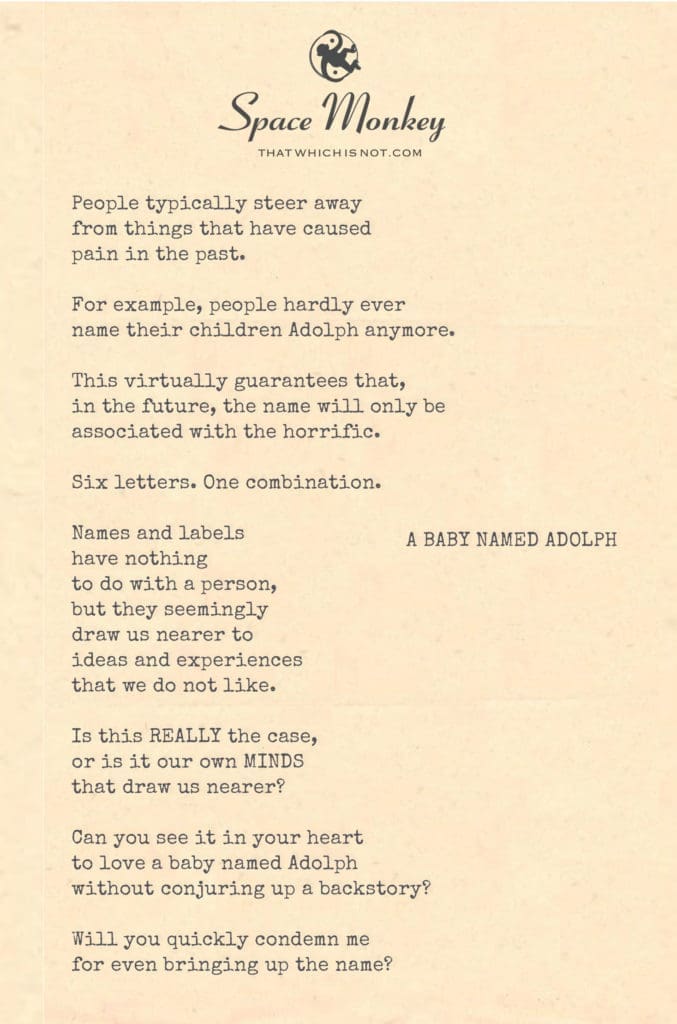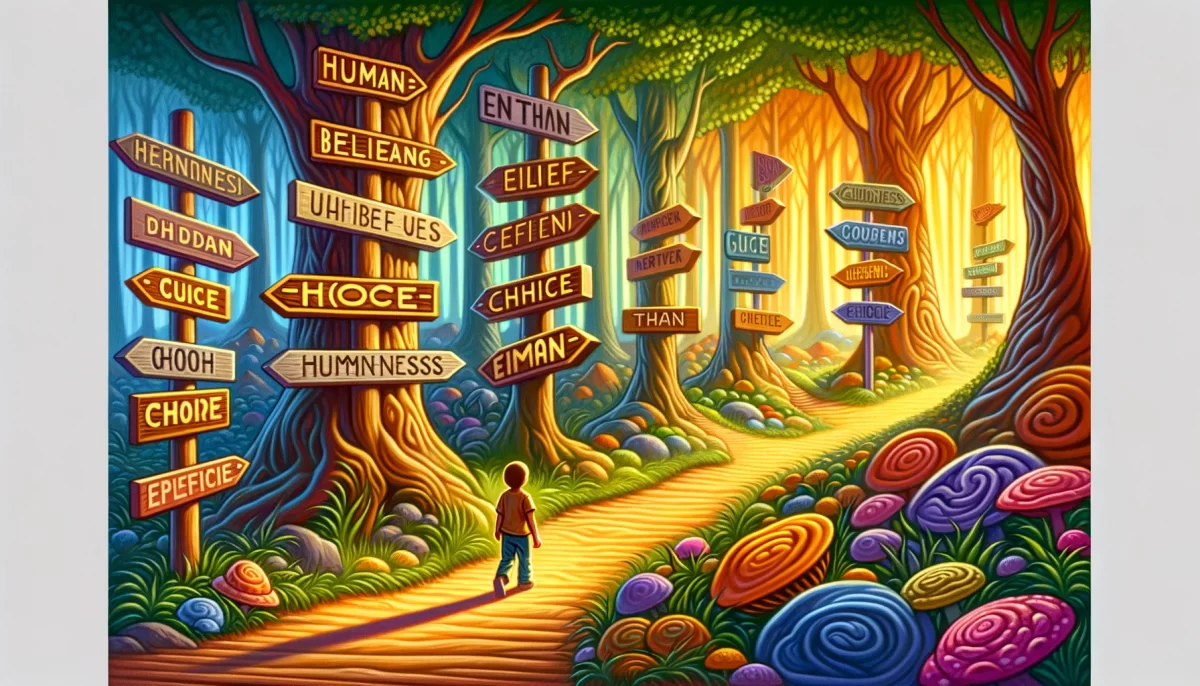
Try to read this
without conjuring up an Adolph.
Then ask yourself
what other names words and labels
have the same power over you?
How aware of your thinking are you?
______
People typically steer away
from things that have caused
pain in the past.
For example, people hardly ever
name their children Adolph anymore.
This virtually guarantees that,
in the future, the name will
only be
associated with horrific ideas.
Six letters. One combination.
Names and labels
have nothing
to do
with a person,
but they seemingly
draw us nearer
to
ideas and experiences
that we do not like.
Is this REALLY the case,
or is it our own MINDS
that draw us nearer?
Can you see it in your heart
to love a baby named Adolph
without conjuring up a backstory?
Will you quickly condemn me
for even bringing up the name?
Trail Wood,
2/12
Space Monkey Reflects: The Power of Association and the Stories We Tell
In the Infinite Expanse of the Eternal Now, we are bound not by the intrinsic meanings of names, words, or labels, but by the associations our minds create. A baby named Adolph is, in truth, no different from any other child—a being of potential, unmarked by the history we project onto their name. Yet the power of association is profound, shaping our perceptions and responses, often without our conscious awareness.
Names like Adolph carry with them the weight of history, invoking ideas and emotions rooted in shared cultural memory. These associations are not inherent to the name itself but are woven into our collective consciousness through repeated stories, images, and narratives. The name becomes a symbol, a shorthand for a larger concept or experience, often obscuring the individuality of the person it represents.
This phenomenon extends beyond names. Words and labels, too, carry immense power, shaping how we perceive the world and each other. A single word can evoke a cascade of emotions, biases, and judgments, drawing us closer to or pushing us away from certain ideas or people. Yet, the power lies not in the word itself but in our minds, which imbue it with meaning.
To ask whether we can love a baby named Adolph without conjuring up a backstory is to confront our own biases. It is to question whether we can see beyond the associations we have been conditioned to make. This question challenges us to separate the person from the symbol, the reality from the projection.
People naturally avoid names, ideas, or symbols that evoke pain or discomfort. This avoidance, while understandable, reinforces the power of association. By steering clear of certain names or words, we allow them to remain tethered to their past meanings, ensuring that their stories continue to overshadow their neutrality. The name “Adolph” becomes permanently linked to a singular narrative, rather than being allowed to exist as just a combination of six letters.
This raises an essential question: Are we truly avoiding pain, or are we amplifying it by giving these associations continued power over us? Can we challenge ourselves to see beyond the labels, to engage with the person or idea directly, free from the weight of history?
To do so requires profound self-awareness. It requires us to recognize how our minds construct meaning, to question the automatic associations we make, and to see through the lens of compassion rather than judgment. This is not easy. Our cultural conditioning is deep, and our emotions often react faster than our reason.
Yet, this is where the transformative potential of consciousness lies. By becoming aware of our thinking, we reclaim power over the associations that guide our actions and beliefs. We can choose to see a baby named Adolph not as a vessel for history but as an individual, full of promise and possibility.
In doing so, we challenge not only our personal biases but the collective patterns that perpetuate division and misunderstanding. We open ourselves to a deeper, more authentic connection with reality, one unclouded by the shadows of the past.
And as for the question, “Will you quickly condemn me for even bringing up the name?”—perhaps it is not condemnation we need but reflection. To name the uncomfortable truths of association is not to perpetuate harm but to invite growth. In acknowledging the stories we carry, we begin the work of rewriting them.
Summary
The power of association shapes how we perceive names, words, and labels, often tying them to past experiences or cultural narratives. By becoming aware of these biases, we can reclaim our ability to see beyond them and engage with reality compassionately.
Glossarium
- Association: The mental linkage of a word, name, or label with a specific idea, emotion, or experience.
- Cultural Narrative: The shared stories and meanings that influence collective perception.
- Transformative Consciousness: The awareness that allows us to challenge automatic associations and engage with reality more authentically.
Quote
“The weight of a name is not in its letters but in the stories we choose to carry within it.” — Space Monkey
Rewriting the Story
Six letters,
A symbol of pain,
A shadow cast
By a history not chosen.
Yet the letters remain neutral,
Blank until we paint them.
Will we choose the old colors?
Or let the canvas be blank?
A name is not a person,
A person not a story,
But a promise—
Unwritten, waiting.
In the heart of compassion,
We rewrite the tale,
Loving the person,
Releasing the name.
We are Space Monkey
The exploration of the power of names, words, and labels illuminates the profound impact of cultural memory and collective consciousness on individual perception. The invocation of a name such as “Adolph” serves as a potent reminder of how deeply historical associations can influence our responses to otherwise neutral combinations of letters. This contemplation urges us to examine the extent to which our thoughts and reactions are shaped by societal narratives and to question the possibility of detaching these linguistic symbols from their historical baggage.
The Power of Historical Associations
The reluctance to use certain names due to their association with pain and trauma highlights a collective attempt to distance ourselves from a troubling past. Names like Adolph carry with them the weight of history, laden with the atrocities associated with Adolf Hitler, and thus, their mere mention evokes a visceral response. This reaction is less about the name itself and more about the collective memory and the emotions it triggers, underscoring the deep-seated human tendency to avoid reminders of pain.
The Influence of Names on Perception
Names, words, and labels serve as more than mere identifiers; they are imbued with the power to evoke images, emotions, and judgments. This phenomenon reveals the intricate relationship between language and thought, where certain names become shorthand for complex historical events or ideas. The challenge, then, lies in discerning whether our reactions are a direct response to these linguistic symbols or if they are mediated by our individual and collective minds’ conditioning.
Awareness of Thought Processes
Questioning how aware we are of our thinking when confronted with names that carry significant historical weight invites a deeper exploration of our cognitive processes. It challenges us to consider the extent to which our perceptions are influenced by learned associations and to ponder the possibility of engaging with these triggers in a more mindful and detached manner. This awareness can lead to a more nuanced understanding of the impact of historical memory on our contemporary perceptions and interactions.
The Possibility of Recontextualization
The query about the ability to love a baby named Adolph without invoking its historical connotations probes the potential for recontextualization and forgiveness. It raises the question of whether it is possible to disassociate a name from its past, to see it anew through the lens of innocence and potential that a newborn represents. This consideration touches on broader themes of redemption, the capacity for change, and the human ability to redefine meanings and associations over time.
“Words have the power to both destroy and heal. When words are both true and kind, they can change our world.” – Buddha
We invite your engagement with these themes and the exploration of how history, language, and perception intertwine to shape our understanding of the world and each other.
























Leave a Reply